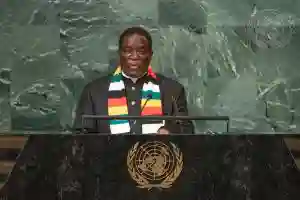President Emmerson Mnangagwa has said Zimbabwe is making notable economic growth despite the existence of sanctions imposed on the southern African country by western powers at the turn of the millennium.
In his address at the General Debate of the 77th Session of the United Nations General Assembly in New York this Thursday, President Mnangagwa said:
Zimbabwe has made strides towards ending poverty and hunger. This has seen the implementation of various policies and programmes to support and empower communal and small-scale farmers. At the household level, the provision of agriculture inputs, equipment and technical support to farmers, especially the vulnerable, has contributed to household and national food and nutrition security. However, in 2022, mid-season drought and tropical cyclones regrettably reduced the overall performance of the agriculture sector. To this end, the climate change conundrum has continued to be an albatross.
The United Nations Framework Convention on Climate Change and the Paris Agreement should remain the primary platform for negotiating our collective global response to climate change. All measures taken to achieve the targets and commitments set under the Paris Agreement have to be implemented. Furthermore, the principle of “Common but Differentiated Responsibilities and Respective Capabilities” in light of the different national circumstances must also be reflected.
Financing for climate change has remained inadequate, leaving the scope for effective and just transition to renewable energy among developing countries under serious threat. It is our hope that at COP 27 in Egypt, later this year, the developed countries will deliver more concrete action on climate change, not just for mitigation targets, but also, in relation to adaptation, loss and damage, climate-specific finance, technology transfer and capacity building. In our case, Zimbabwe is making concerted and deliberate efforts to integrate climate action into our national policies, strategies and planning. This includes strengthening resilience and the adaptive capacity of the most vulnerable in our society.
Additionally, my Government is implementing an ambitious programme to increase the number of dams for irrigation. The programme is expected to create greenbelts across the country, as we reduce dependence on rain-fed agricultural activities while enhancing export production and productivity. Our comprehensive Agriculture Transformation Strategy is focused on increasing production and productivity across the entire agriculture spectrum.
Zimbabwe is committed to Agenda 2030 and has to this end, mainstreamed the 17 SDGs into our national economic development blueprint, the National Development Strategy. We acknowledge the support of the United Nations in the alignment of this Strategy to the Sustainable Development Goals.
Economic reforms have been implemented resulting in significant progress in sectors such as agriculture, manufacturing, mining and tourism. Our “Zimbabwe is open for business” mantra has fostered strong partnership between the Government and the private sector for inclusive and sustainable development. Massive infrastructure development projects which include dams, energy plants and roads have broadened our national economic asset base as well as production and productivity enablers while enhancing regional connectivity and integration.
Notwithstanding our success, the ongoing deleterious effects of the illegal sanctions continue to hamper and slow down our progress and the realisation of sustainable and inclusive development.
Zimbabwe is a peace-loving country. We remain indebted to the SADC region and the African Union, as well as other progressive members in the comity of nations for their unwavering support and calls for the removal of these unwarranted and unjustified sanctions. We once again call for their immediate and unconditional removal. My country welcomes the findings of the United Nations Special Rapporteur on the Negative Impact of the Unilateral Coercive Measures on the Enjoyment of Human Rights, who visited Zimbabwe in 2021.
He also spoke on the country’s engagement and re-engagement policy underpinned by the principles of mutual understanding, respect, cooperation and shared values in the spirit of “a friend to all and an enemy to none.”
Zimbabwe’s economy has been going down since 2019 with authorities citing “economic saboteurs”, COVID-19 and sanctions as the main factors affecting growth.
Government critics say corruption is the main enemy of progress amid reports that the southern African country is losing billions of dollars yearly through illicit trade.

